Wagyu around the World - Germany
History of breeding Wagyu in Germany
Some farmers had independently imported Wagyu embryos over a few years from 2004 and established 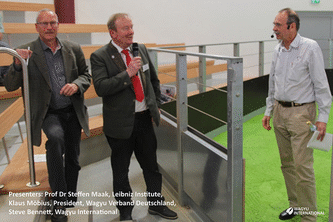 their own herds. It was in the autumn of 2007 that two Angus breeders - Klaus Möbius and Benjamin Junck - discussed forming a Wagyu association to promote the Wagyu breed in Germany. After preliminary discussions, a meeting was held amongst other breeders in Mittelbach in Saxony on 27th June 2008. Nine founding members selected the Board of Directors and the Advisory Board. The application was formalised in November at the animal production fair “EuroTier” at Hanover. The registration of the association was approved early in 2009 and breeding objectives were determined and promotion of the breed commenced. Ties were established with the Wagyu associations in Australia, USA and Canada.
their own herds. It was in the autumn of 2007 that two Angus breeders - Klaus Möbius and Benjamin Junck - discussed forming a Wagyu association to promote the Wagyu breed in Germany. After preliminary discussions, a meeting was held amongst other breeders in Mittelbach in Saxony on 27th June 2008. Nine founding members selected the Board of Directors and the Advisory Board. The application was formalised in November at the animal production fair “EuroTier” at Hanover. The registration of the association was approved early in 2009 and breeding objectives were determined and promotion of the breed commenced. Ties were established with the Wagyu associations in Australia, USA and Canada.
Members of the Wagyu Association Germany have fullblood Wagyu 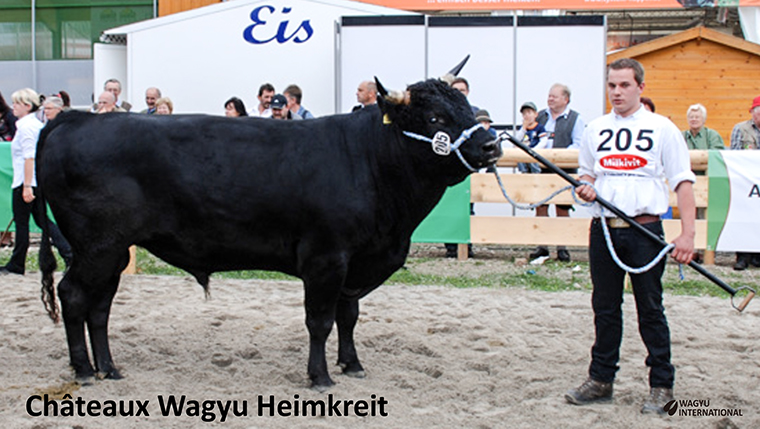 that are descendants from the Japanese genetics that was exported then bred in USA, Canada and Australia. The first goal of the association has been achieved as registrations of Wagyu raised in Germany are recorded in the German Studbook. Numbers are being consolidated through the use of embryos.
Both Black Wagyu and Red Wagyu are raised and herds are spread throughout Germany. The association is is very active and the profile of the breed is increasing.
that are descendants from the Japanese genetics that was exported then bred in USA, Canada and Australia. The first goal of the association has been achieved as registrations of Wagyu raised in Germany are recorded in the German Studbook. Numbers are being consolidated through the use of embryos.
Both Black Wagyu and Red Wagyu are raised and herds are spread throughout Germany. The association is is very active and the profile of the breed is increasing.
The Annual General Meeting is held in July. The association, with 180 members, is the largest Wagyu association in Europe. The number of fullblood Wagyu females is above 500.
Founder of the Wagyu Association Germany is Klaus Möbius of 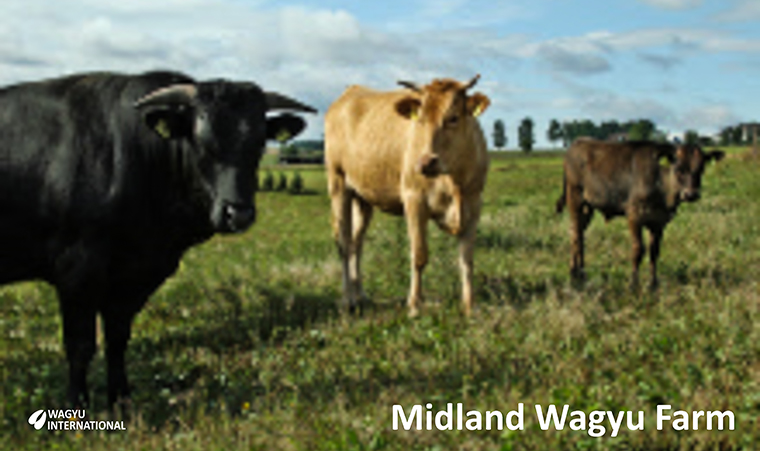 Midland Wagyu Farm. This is an arable farm in Mittelbach in Saxonia which breeds Wagyu (since 2005) and Angus. Vice-Chair is Dr Benjamin Junck of Vornagel Genetics in Jungingen in Baden-Württemberg. He has a registered Angus herd and a Wagyu fullblood herd and is an active office bearer in the German beef industry. Treasurer is Hans-Jürgen Kühl, breeding manager on a fullblood Wagyu and Holstein farm at Bordesholm in Schleswig-Holstein.
Midland Wagyu Farm. This is an arable farm in Mittelbach in Saxonia which breeds Wagyu (since 2005) and Angus. Vice-Chair is Dr Benjamin Junck of Vornagel Genetics in Jungingen in Baden-Württemberg. He has a registered Angus herd and a Wagyu fullblood herd and is an active office bearer in the German beef industry. Treasurer is Hans-Jürgen Kühl, breeding manager on a fullblood Wagyu and Holstein farm at Bordesholm in Schleswig-Holstein.
The Advisory Board comprises Steffen Schäfer of Der Vogelsberger in Romrod-Zell, Ronald Haake from Havelberg in Sachsen-Anhalt and Ludwig Maurer of Schergengruber Wagyu in Rattenberg in Bavaria.
Several members and the executive attended the inaugural World Wagyu Congress in Queensland in May 2015.
The first Fullblood Wagyu sale in Europe was successfully held in Münster on 11-12 September, 2015. Auctioneer Andreas Aebi came from Switzerland. 45 lots were on offer and they included 30 females. The gala has become an annual event.
Uwe Jerathe of Wagyu-Genetics is President of the association from the AGM of July 2019. He also holds an annual production sale with invited consignors.
Sakura Wagyu was started in 2004 in Lautertal by Barbara Hartmann with fullblood Wagyu and now comprises a herd of 21. The beef is dry-aged for 6 weeks and vacuum packed for delivery.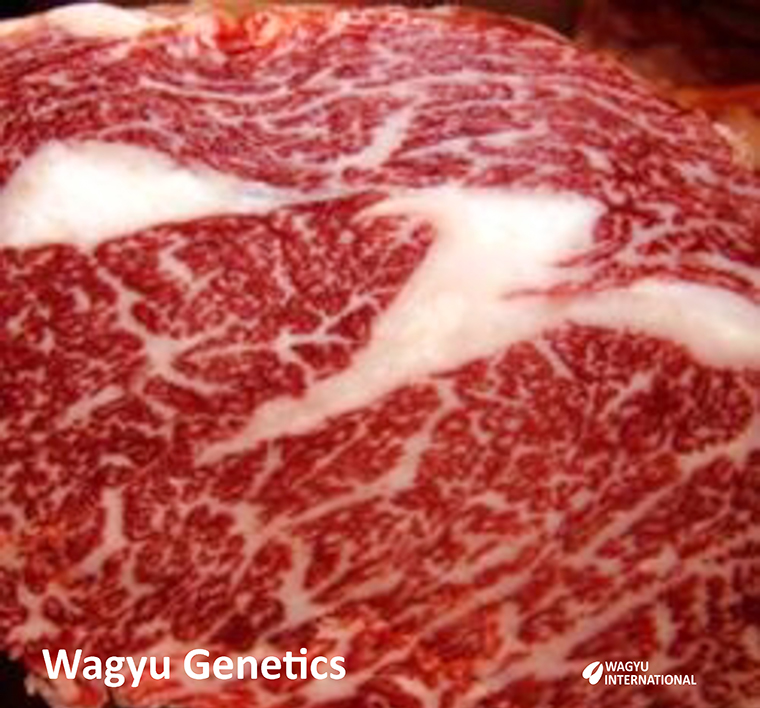
A dairy farm in Stödtlen in part of the Schwäbischen Ostalb has been in the same family for eleven generations over 400 years. Wagyu were introduced by Thomas & Heinrich Spang in 2005 to form "Virngrund Wagyu" and now it contains one of the biggest pure Wagyu herds. Westholme genetics from Australia is the basis of this herd with a biase towards the Tajima strain. The animals move freely between pasture and stable and close contact with the stock is maintained. Beer by-products - such as brewers yeast - are obtained locally and the slow growth from free range access makes them ready to market at three years of age but premium quality is guaranteed.
Embryos and semen were imported in June 2006 by Uwe Jerathe to form "Wagyu-Genetics". He was a founding member of the association. Semen from Yasuzane which links Yasufuku with Suzutani has been used over the initial imports. The poll gene has been introduced through 'purebred' imports from America and are being upgraded. Fullblood Wagyu genetics is available from "Wagyu-Genetics".
Wagyu have been raised since 2006 in Lower Bavaria by Christian Lang and Angelika Heller as "Wagyu Weide". The farm has been in the family since the 17th Century.
After the unification of Germany, two brothers switched from careers as electricians and carpenters to take over the farm in 1999 that had been reinstated back to their parents. The farm is situated in Kuhlhausen in the north of Sachsen-Anhalt near the junction of the rivers Elbe and Havel. This area is important as a breeding area, stopover site and wintering ground for waders and waterfowl.
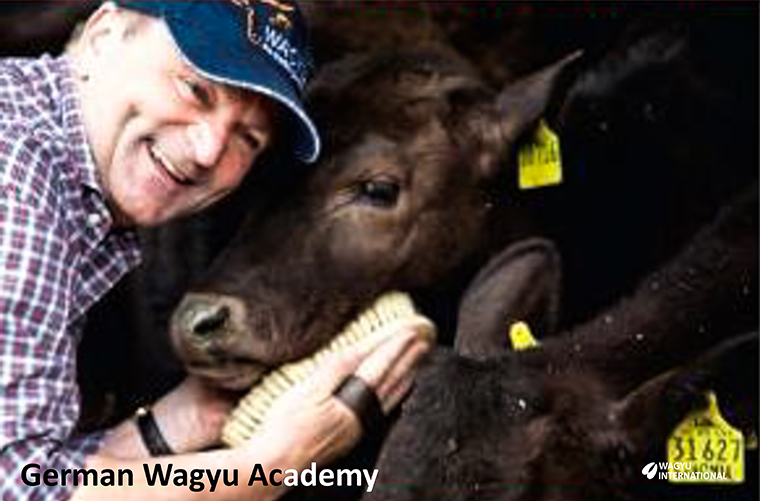 Wagyu semen was imported for crossing in 2008 but a decision was made to breed pure Wagyu. Embryos were imported from breeders in Australia and the calves born in May 2010 formed the basis of the fullblood herd "Havel-Wagyu-Zucht" on 150 hectares of pasture. After that success, more embryos were imported in 2011 from Australia.
Wagyu semen was imported for crossing in 2008 but a decision was made to breed pure Wagyu. Embryos were imported from breeders in Australia and the calves born in May 2010 formed the basis of the fullblood herd "Havel-Wagyu-Zucht" on 150 hectares of pasture. After that success, more embryos were imported in 2011 from Australia.
In winter the cattle are housed and are fed hay, litter and grass silage with concentrate mixed from crops grown at our farm plus bought minerals. The calves grow up naturally and are weaned at 7 months. They are slowly fattened to yield the exquisite quality of meat they're famous for by the age of 3 years.
Fullblood bulls, pregnant heifers and heifers are for sale as well as F1 and F2 progeny for commercial production.
Wagyu were introduced by Reinhard Holtmann onto "Wagyu Münsterland" in 2009. Wagyu beef from fullbloods is available.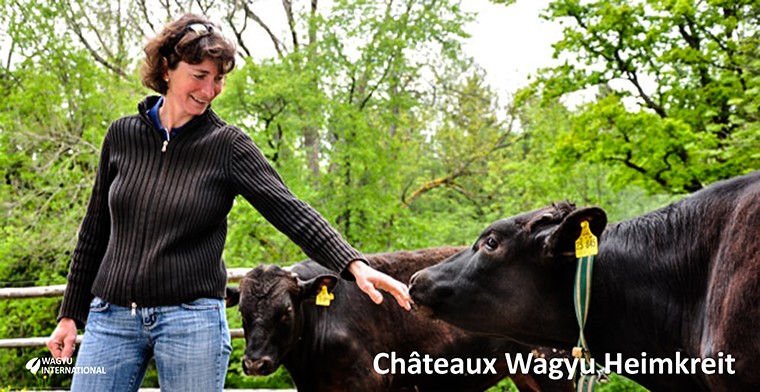
Sepp Krätz grew up on a farm between Augsburg and München and learnt the skills of a butcher after school. After 20 years he acquired a farm and built up a Wagyu herd. In 2009 he travelled to Japan, USA and Australia with Tina Fichtel to learn about husbandry from the experts and now commands a premium of almost 200€ per kilogram for some cuts from his fullblood herd of 100 animals. Sepp established the "German Wagyu Academy" and Wagyu burgers have been served in his hippodrome at the festive Wies'n during the Oktoberfest.
Andrea & Rüdiger Marquardt farm 80 registered Wagyu fullbloods on 162 hectares on "Holstein Wagyu". Only 12 head are slaughtered annually. The first sexed Wagyu semen in Europe was available from Yojimbo.
Châteaux Wagyu is an association of Wagyu breeders who share the same principles of husbandry in Europe and are represented in Belgium (Château Altembrouck), Wales (Voelas) and France (Chateau de la Pouvriere). "Châteaux Wagyu Heimkreit" is a small pure herd run by the Mller-Gut family at Wackersberg and is certified to be organic.
Genetics in Germany
Trent Bridge F115 has carcass progeny data as four of his progeny have been digitally analysed and incoporated into September 2022 BreedPlan. 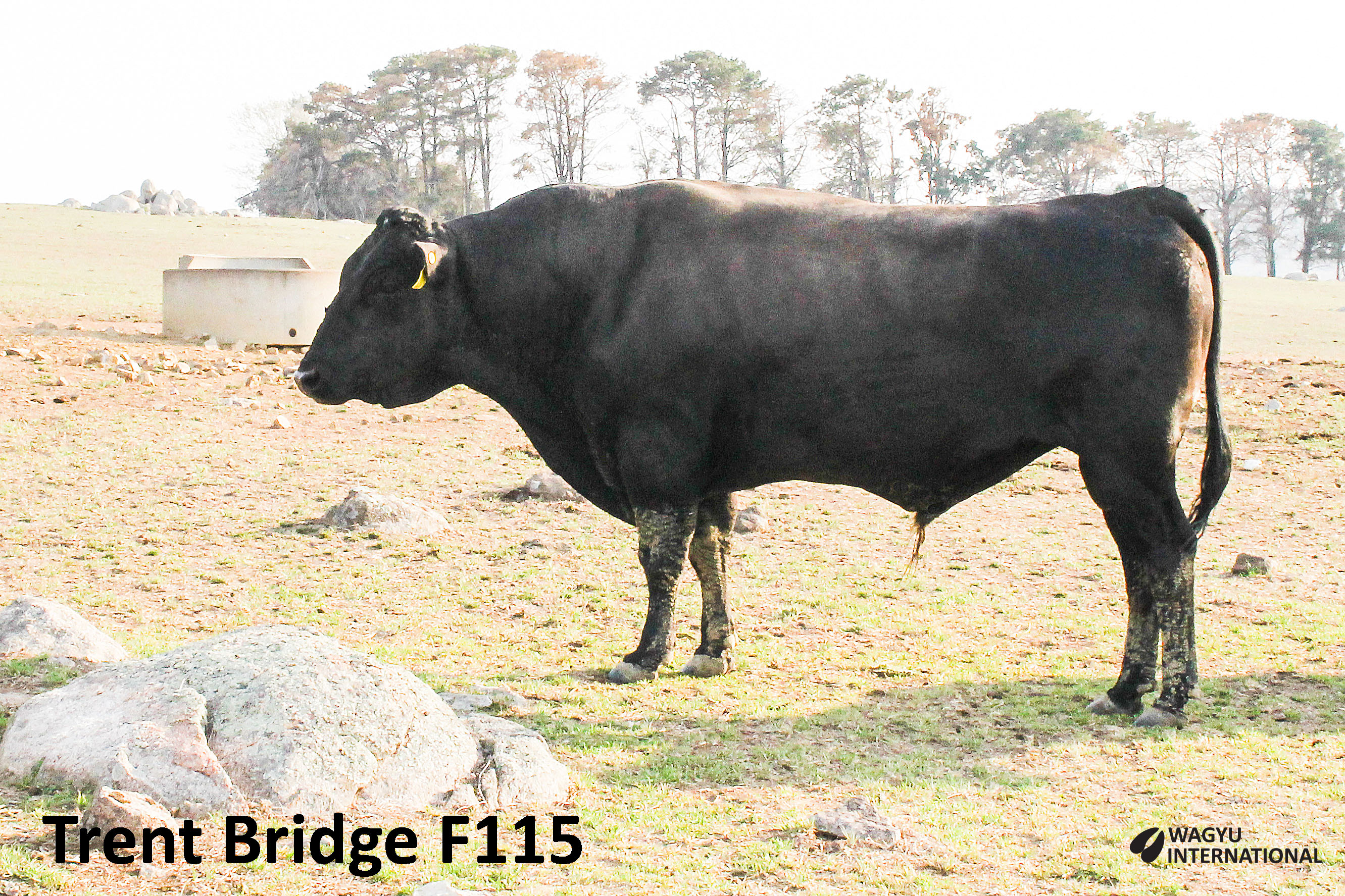 His superior carcass genomic EBVs have been endorsed with higher accuracy. F115 can be used with greater confidence for excellent marbling (IMF%) and quality with fineness together with strong loin and also abundance in the loin from strong EMA. This positions his semen as ideal for terminal beef production. The best base breeds are Fleckvieh, Gelbvieh, Charolais and Holstein/Friesian with their weight and milk while F115 brings marbling and carcass qualities together with fat cover over lean breeds. Low birth weight EBV is another benefit making F115 better suited to open heifers too.
His superior carcass genomic EBVs have been endorsed with higher accuracy. F115 can be used with greater confidence for excellent marbling (IMF%) and quality with fineness together with strong loin and also abundance in the loin from strong EMA. This positions his semen as ideal for terminal beef production. The best base breeds are Fleckvieh, Gelbvieh, Charolais and Holstein/Friesian with their weight and milk while F115 brings marbling and carcass qualities together with fat cover over lean breeds. Low birth weight EBV is another benefit making F115 better suited to open heifers too.
The new generation genetics is lifting the standard of breeding in the Wagyu breed. Circle8Bulls Q122 has 52 carcass progeny and is a Trait Leader for Eye Muscle Area and very strong for marble score and fineness together with growth and Carcass weight. The following semen is also recommended for use in Fullblood Wagyu breeding in Germany:
| NAME OF ANIMAL | COLOUR | TYPE | CONTACT |
| Capital Country Apex II R5 | Black | Semen | Wagyu Genetics Jerathe |
| Circle8Bulls Q122 | Black | Semen | Wagyu Genetics Jerathe |
| Lisheen N23 | Black | Semen | Lisheen Wagyu |
| Lisheen P26 | Black | Semen | Lisheen Wagyu |
| Lisheen Q39 | Black | Semen | Lisheen Wagyu |
| Mayura Pioneer | Black | Semen | Wagyu Genetics Jerathe |
| Trent Bridge F115 | Black | Semen | Wagyu Genetics Jerathe |
| WG Hirashiget 045 | Black | Semen | Wagyu Genetics Jerathe |
Association and reference
Australian Wagyu Association. Database search on internet, first September 2022 run.
German Wagyu Academy website.
German Wagyu Genetics website.
Holstein Wagyu website.
Lisheen Wagyu website.
Wagyu DE GmbH website.
Wagyu Verband Deutschland
DISCLAIMER Wagyu International provides information that has been supplied by other parties and gives no warranty (express or implied) as to the data completeness, accuracy or fitness for a particular purpose.
